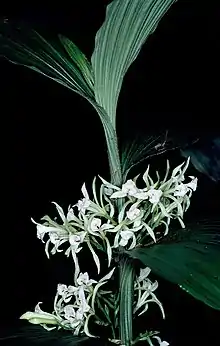Corymborkis veratrifolia
Corymborkis veratrifolia, commonly known as the white cinnamon orchid[2] is a plant in the orchid family and is native to areas from tropical and subtropical Asia to Australia and the Pacific Islands. It is an evergreen, terrestrial orchid with a thin, upright stem, papery, pleated leaves and a short flowering stems with up to sixty crowded, short-lived green and white flowers.
| White cinnamon orchid | |
|---|---|
 | |
| Corymborkis veratrifolia in the Flecker Botanical Gardens | |
| Scientific classification | |
| Kingdom: | Plantae |
| Clade: | Tracheophytes |
| Clade: | Angiosperms |
| Clade: | Monocots |
| Order: | Asparagales |
| Family: | Orchidaceae |
| Subfamily: | Epidendroideae |
| Genus: | Corymborkis |
| Species: | C. veratrifolia |
| Binomial name | |
| Corymborkis veratrifolia | |
| Synonyms[1] | |
|
List
| |
Description
Corymborkis veratrifolia is a terrestrial, evergreen herb that forms clumps and has thin rhizomes and thin, upright, unbranched, wiry stems 0.5–1.5 m (2–5 ft) tall. There are between six and fifteen narrow elliptic leaves 200–300 mm (8–10 in) long and 70–100 mm (3–4 in) wide. The leaves are dark green, thin-textured and corrugated. Between twenty and sixty short-lived, cinnamon-scented flowers are crowded along the branched flowering stem, the flowers 20–25 mm (0.8–1 in) wide. The sepals are green, linear to lance-shaped or spatula-shaped, 32–38 mm (1.3–1.5 in) long and 2–3 mm (0.08–0.1 in) wide. The petals are white, 25–30 mm (0.98–1.2 in) long, 3–4 mm (0.1–0.2 in) wide and wavy. The labellum is pale white, 20–25 mm (0.8–1 in) long and 8–12 mm (0.3–0.5 in) wide with a narrow tube-shaped base and a broad egg-shaped end with wavy edges. Flowering occurs between December and March in Australia, December to July in New Guinea and in July in China.[2][3][4][5]
Taxonomy and naming
The white cinnamon orchid was first formally described in 1825 by Caspar Georg Carl Reinwardt who gave it the name Hysteria veratrifolia and published the description in Sylloge Plantarum Novarum Itemque Minus Cognitarum a Praestantissimis Botanicis adhuc Viventibus Collecta et a Societate Regia Botanica Ratisbonensi Edita.[6][7] Later the same year, Carl Ludwig Blume changed the name to Corymborkis veratrifolia.[8] The specific epithet (veratrifolia) is derived from the Latin words veratrum meaning "hellebore"[9]: 832 and folia meaning "leaves".[9]: 466
Distribution and habitat
Corymborkis veratrifolia grows in shady places in forest and rainforest in China, Taiwan, Cambodia, India, Indonesia, the Ryukyu Islands, Laos, Malaysia, Myanmar, Sri Lanka, Thailand, Vietnam, islands in the south west Pacific and northern Australia. In Australia it is found between the Iron Range and Airlie Beach in Queensland.[2][3][5]
References
- "Corymborkis veratrifolia". Australian Plant Census. Retrieved 20 May 2023.
- Jones, David L. (2006). A complete guide to native orchids of Australia including the island territories. Frenchs Forest, N.S.W.: New Holland. p. 354. ISBN 1877069124.
- "Corymborkis veratrifolia". Orchids of New Guinea. Retrieved 9 September 2018.
- D.L.Jones; T.Hopley; S.M.Duffy (2010). "Factsheet - Corymborkis veratrifolia". Australian Tropical Rainforest Orchids. Centre for Australian National Biodiversity Research (CANBR), Australian Government. Retrieved 30 May 2021.
- Lan, Guan Hua. "corymborkis veratrifolia". Flora of China. Retrieved 9 September 2018.
- "Hysteria veratrifolia". APNI. Retrieved 9 September 2018.
- Reinwardt, Caspar (1825). Sylloge Plantarum Novarum Itemque Minus Cognitarum a Praestantissimis Botanicis adhuc Viventibus Collecta et a Societate Regia Botanica Ratisbonensi Edita (Volume 2). London. p. 5. Retrieved 10 September 2018.
- "Corymborkis veratrifolia". APNI. Retrieved 10 September 2018.
- Brown, Roland Wilbur (1956). The Composition of Scientific Words. Washington, D.C.: Smithsonian Institution Press.